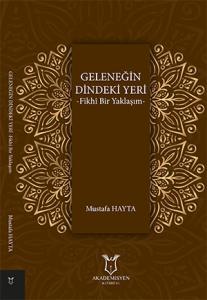Geleneğin Dindeki Yeri -Fıkhî Bir Yaklaşım-
Özet
Bu kitap, gelenek kavramının dindeki yerini fıkhi bir yaklaşımla ele almaktadır. Yazar, dinî ilimlerin genelinde olduğu gibi fıkıh usulünde de kaynakların Kur'an ve Sünnet olduğunu belirtmektedir. Ancak bu kaynakların yorumu ve uygulamaları zaman, zemin ve şartlara göre farklılık gösterebilmektedir. Bu farklılıkların doğal olduğunu vurgulayan yazar, her bireyin kendi sosyo-kültürel ve fiziki çevresinden etkilenerek köklü bir geleneğe sahip olduğunu ifade etmektedir. Bu farklılıkların ortaya çıkması ve farklı görüşlerin oluşması kadar doğal bir şey olmadığını belirten yazar, mezheplerin bu farklılıkların somut örnekleri olduğunu ifade etmektedir. Yazar, farklılıkları bir kenara bırakıp belirli prensip ve usuller çerçevesinde bu farklılıkları birleştirmenin önemine değinmektedir. Bu amaçla örf ilkesinin ortaya çıktığını belirten yazar, bu çalışmanın örf ilkesinin ma'ruf kavramından hareketle temellendirilmesini amaçladığını ifade etmektedir. Çalışma, giriş ve üç bölümden oluşmaktadır. Giriş bölümünde çalışmanın konusu, amacı ve yöntemi hakkında bilgi verilmektedir. Birinci bölümde ma'ruf ve örf kavramlarının etimolojik anlamı ve Kur'an'daki kullanımları ele alınmaktadır. İkinci bölümde örf ve âdet kavramları değerlendirilerek örfün usuldeki mevki, kaynak değeri ve hukukun kaynağı olması bakımından sınırları üzerinde durulmaktadır. Son bölümde ise Kur'an'a dayandırılan ve örfün fıkhî hükümlere etkisini ele alan bir değerlendirme yapılmaktadır.
This book examines the place of tradition in religion from a jurisprudential perspective. The author states that, like in the general field of religious sciences, the sources in jurisprudence are the Quran and the Sunnah. However, the interpretation and application of these sources can vary depending on time, place, and circumstances. The author emphasizes that these differences are natural and highlights that every individual is influenced by their socio-cultural and physical environment, thus having a deep-rooted tradition. The author also states that it is not only natural for these differences to arise and different opinions to form, but also emphasizes that sects are concrete examples of these differences. The author emphasizes the importance of setting aside these differences and uniting them within certain principles and methods. In this regard, the author mentions the emergence of the principle of custom and aims to justify this study based on the concept of ma'ruf. The study consists of an introduction and three chapters. The introduction provides information about the subject, purpose, and methodology of the study. The first chapter discusses the etymological meaning and usage of the concepts of ma'ruf and custom in the Quran. The second chapter evaluates the concepts of custom and tradition, focusing on their position in jurisprudence, their value as sources, and their role as a source of law. The final chapter provides an assessment of the impact of custom on juridical rulings, based on the Quran.

Yayınlanan
Lisans
LisansBu İnternet Sitesi içeriğinde yer alan tüm eserler (yazı, resim, görüntü, fotoğraf, video, müzik vb.) Akademisyen Kitabevine ait olup, 5846 sayılı Fikir ve Sanat Eserleri Kanunu ve 5237 sayılı Türk Ceca Kanunu kapsamında korunmaktadır. Bu hakları ihlal eden kişiler, 5846 sayılı Fikir ve Sanat eserleri Kanunu ve 5237 sayılı Türk Ceza Kanununda yer alan hukuki ve cezai yaptırımlara tabi olurlar. Yayınevi ilgili yasal yollara başvurma hakkına sahiptir.
